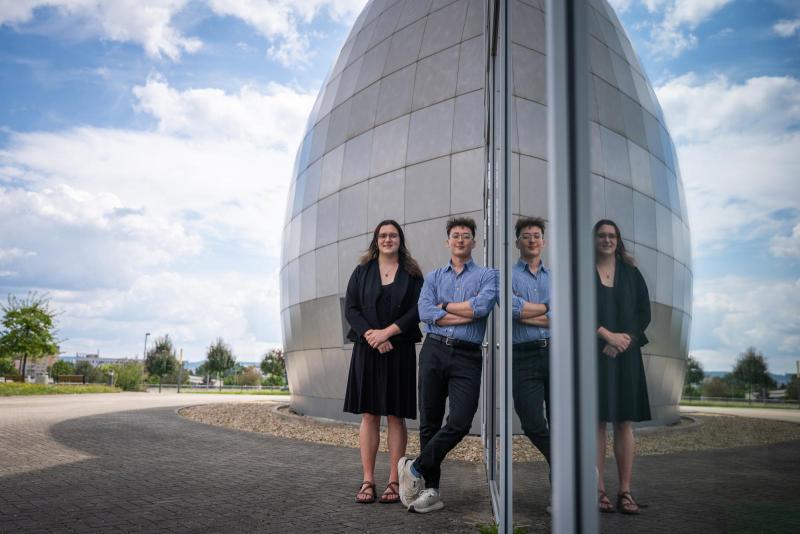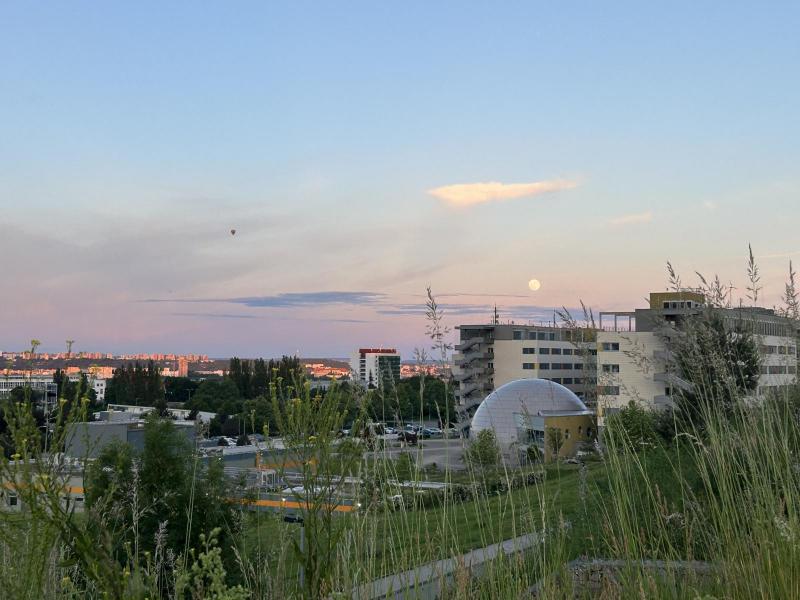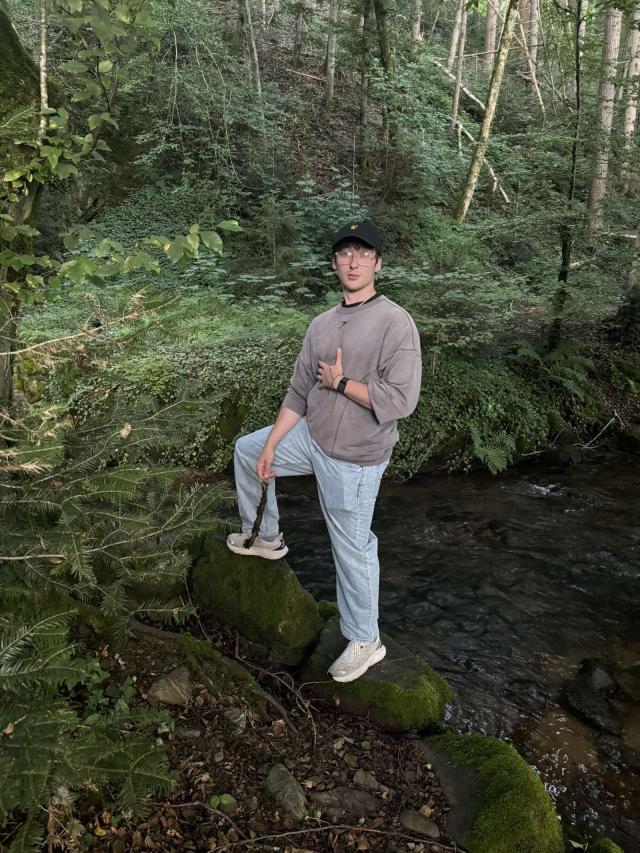People
Summer research programme at BUT inspired American students to pursue PhD

What made you want to participate in this programme?
Simon: I saw it as an opportunity to not only expand my knowledge in cutting-edge electrical engineering research, but also to experience different cultures, different lifestyles and, overall, to try and better myself.
Rowan: I had a couple of reasons. I was looking into going to graduate school and doing research when I graduated, and I wanted a taste of that before I got to it to make sure that it’s really the path that’s right for me. I also really like travelling. I’ve been to Ireland previously and I wanted to see more of Europe. I also had Dr Freeborn as a professor and I liked the way he taught, so I figured his programme was probably pretty good.
What is your focus in the fractional order systems area?

Typically, you would only use filters in integer order, which are whole number ordered – first order, second order. My research is to see how we can use fractional order in one-and-a-half-order filter or two-and-a-half-order filter. There’s already been some research, but I want to expand on it and make it a lot easier to use for application.
Simon: I am trying to create a physical device that would mimic a fractional order capacitor across multiple frequency bandwidths. The goal is to reduce the strain on researchers who don’t necessarily have the resources to test a constant phase element or a fractional order capacitor at a specific phase.
The work is very general and exploratory, a lot of it is simply exploring different avenues to see what is and what isn’t working. The aim is to help others in the future.
It seems like you’re both making it easier on the people who come after you.
Simon: Yeah, I think a good goal of mine is to make sure that whoever picks up my work has an easier time of getting into it than I did.
Rowan: Neither of us are necessarily designing something that’s going to be applied and become a product, but we are helping people who might be designing products or people who might want to use our research in another way. We’re not designing something that’s going to go in a space shuttle or anything, but if at some point someone discovers they need a fractional order filter, instead of having to go through the loops of calculating it, they could use some of my code, or they could repurpose what Simon has been building and use his ideas.
Have you always wanted to be electrical engineers?
Simon: I initially wanted to be a surgeon and went through all of high school believing that. Then I got into college and realised that it isn’t for me. By the time I got there, I had already built my own computer, and so I thought, well, this is something I’m really interested in. In the end it was kind of a no-brainer. The more I learned about computers and how they worked, the more I realised that this is something I’m really passionate about.
Rowan: I had no idea what I wanted to be as a kid, but I've always had this perspective that I could probably enjoy whatever I'm doing as long as it's meaningful or I feel like it's contributing. I think I ended up on the engineering path because I was really good at math and science as a child. When I started at UA, I originally wanted to do chemical engineering, which I got talked out of, and then mechanical engineering, which I didn’t like, and ended up in electrical engineering. The fact that I’m still here and that I am on this programme shows that it was probably the right choice. I’m enjoying what I’m doing and I feel like I’m contributing.
What is your favourite thing about being researchers?
Simon: Coming into this, I had no research experience. This whole summer, a lot has changed. Looking at it in retrospect, I'm so happy I did it. I think the best thing about research is the freedom that it gives you and the ability to just be yourself and explore what you really want to follow.
And it is really nice having a good mentor who can help you, it's like having a second set of eyes that are a lot more experienced than you but can also give you the space and the opportunity to be your own person. Dr. Freeborn gave me a direction and let me run with it and make my own mistakes. I believe one of the most amazing things about being a researcher is just having that freedom.
Rowan: My favourite part is that it's not a waste of time to do something that doesn't ultimately work. We’ve both worked in industry, and you get chided there if you do something that is a waste of time and money, something that ends up not working. Part of the point of research is being able to say, hey, this doesn’t work. That’s still a contribution to knowledge. So, I think that’s my favourite part, that even when you do something that completely fails, you didn’t waste your time, you simply discovered a way not to do it.
What are the biggest differences between UA and BUT?
Simon: I love UA and I’m very grateful for picking the school. I would not change that at all. But I will say that I do find the city of Brno a little more student friendly. I love being able to just easily take the tram into the city. It’s very accessible. I did my freshman year in Alabama during the pandemic, and I didn’t meet anyone. It’s kind of hard getting out and doing anything when you’re stuck on campus. But here it’s so natural, it seems so easy. Plus, you have all these beautiful landscapes here that are way more accessible than the sights in Tuscaloosa where you have to deal with the terrible traffic.Rowan: To that point, I will say I've long been an advocate for the United States to design things for people and not for cars. I love that European universities, and BUT especially, are made for a person to get around and for a person to exist in a space and not travel through it in a car. There’s also much more green space, the walking paths are wider, and there’s far less traffic buzzing past you, making noise. The city of Tuscaloosa exists because of UA, so the greenery and the landscape compliment the university. Meanwhile, BUT compliments the city of Brno and you feel more like an integrated member of society.
What about cultural differences? Did coming here enrich your worldview?
Simon: As an American, our education on the world isn’t as good as it should be. So, coming here and learning more about it provides so much insight... it’s kind of ridiculous. I have a Belarusian roommate who made me “draniki” (traditional Belarusian potato pancakes), which are essentially hash browns. It’s fascinating to me how you can see the connections between food and history, that there are historical reasons for why each country used a particular crop or why the food here is so filling.
Rowan: It's crazy that these two completely different meals have the same name or vice versa. For example, Czech dumplings are not like the dumplings I know. On the other hand, I've found foods here that are just like what I have at home, only with different names. I discovered that “livermush”, a favourite in Appalachia where I'm from, is a direct import from Europe that most Americans haven't heard of. It's amazing to see what made it to America and what didn't, considering so many Americans have European roots.
What will you take from this experience when you go home?
Simon: How do I say this without sounding cheesy? (laugh) This was probably some of the most fun I’ve ever had. Not only was I able to work with super intelligent people, but I also got to explore wildly different places, see all these beautiful structures and meet all these wildly interesting people. And it definitely gave me a new perspective on my future career. Going into this, I wasn’t even sure I wanted to do research, but now I know that I really want to get my PhD.
Rowan: I can’t say that it’s been the best time of my life, because it’s been difficult for a variety of reasons. As a trans woman who came out only a few months before coming on this trip, I was still adjusting and learning a lot in the States. And then I went and upended my life, leaving my friends and my support network to go to a different country on a different continent with people whose language and didn’t speak. So that was really big. And it was very stressful. But what I learned from it is that I can do it. I made it through. I held myself together. And I produced good work along the way. And I also went and saw really pretty sights and took really pretty pictures.
From a pragmatic perspective, I definitely think that it made me realise that research is something I can do, which was one of the main goals of the summer. It helped me decide that, yeah, I’m probably going to try to go down the path of getting a higher education and going into this field if I can.
Award-winning Volteek project offers a modular battery management system developed through a student formula
During a prestigious internship in Israel, a student of FEEC UT investigated the effect of anaesthetics on brain activity
Since he was a child, he dreamed of space. Now he wants to put the first student satellite into orbit
Greater efficiency and completely new applications. Experts from FEEC BUT also collaborate on satellites for very low orbit
A student from BUT founds OMG Robotics and changes the way computer science is taught in Czech schools
